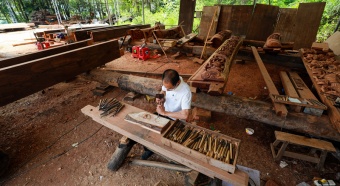
Aerial photo taken on Dec. 1, 2020 shows the mountains surrounded by clouds and mist in Wuyishan National Park, east China's Fujian Province. (Xinhua/Jiang Kehong)
FUZHOU, April 17 (Xinhua) -- Cradling a stag beetle specimen in one palm, Liu Pengyu meticulously brushed away the dust with delicate strokes, fully immersed in the captivating world of insects in his quiet and dimly lit studio.
According to Liu, 43, the stag beetle is a symbol of wilderness, vigor and indomitable spirit, with its sharp and distinctive mandibles stretching out of its head. That is precisely why he selected this insect as the logo for his studio, which houses thousands of well-preserved insect specimens, he explains.
Liu was born and raised in east China's Fujian Province, which boasts the highest forest coverage in China and is a treasure trove of biodiversity. As an only child, he often explored the forest near his home and developed a fascination for the small creatures that lived there, treating them as his companions. His interest in these tiny inhabitants continued to grow over time.
"Fujian is referred to as 'Min' in short and interestingly, the Chinese character for 'Min' includes the symbol for 'bug.'" Liu said. "So I believe it's our responsibility to explore the rich resource of insects here and promote awareness of them among more people."
In Liu's view, understanding is the basis for enhancing awareness of protection. "Some insects look normal but are actually as precious as giant pandas," he said.
Driven by his passion for insects, Liu quit his job in 2017 and rallied over a dozen of individuals with the similar interest to open a studio in Fuzhou, the capital of Fujian. Ever since, they have ventured into numerous mountains, forests and islands throughout China in search of insect species they had never seen before.
"Some bugs are so rare that you can't even find a single picture of them. In such cases, we must rely solely on the limited textual descriptions provided in books," Liu said.
After years of conducting expeditions in the wilderness, the team has become accustomed to encountering poisonous snakes and navigating treacherous mudslides. They frequently travel across challenging terrains in pursuit of insects as tiny as 2 mm, and willingly adjust their sleep schedules to align with the nocturnal habits of certain species.
Despite the many obstacles, they frequently encounter moments of reward that inspire them to continue. For instance, Guo Liang, a member of the team, can still vividly recall his initial encounter with a golden Kaiser-i-Hind, a rare butterfly species, in a pristine forest.
"The butterfly fluttered its wings gracefully above us, with its distinctive markings glistening in the sunlight," Guo recalled. "In that very moment, we were left breathless and in awe."
For a long time, the studies and documentation of newly discovered insect species in China had primarily been conducted by foreign entomologists. However, now the trend is reversing as many Chinese experts such as Liu and Guo, have gotten their namesake insects which were originally found by them.
During their free time, the team often delivers lectures on school campuses to share their knowledge of insects, organizes study tours for students, and teaches them how to create insect specimens. They have also produced hundreds of videos available online, covering a broad range of topics related to insects.
So far, their Douyin account has amassed over 130,000 followers. Occasionally, they also encounter unusual questions in the comment section, such as "Do cockroaches bite?" or "If a gecko's tail got into my ear, would it cause deafness?"
"It made our team realize the significance of educating the public about insects," said Liu. "Regardless of the progress we have made so far, we are merely at the beginning of a long journey ahead."
The team's dedication has undoubtedly left an impact as their social media followers have grown increasingly aware, as more and more of them have expressed a keen interest in learning about the legal protection status of insects.
In recent years, the rise of short-form video platforms has brought more nature enthusiasts into the public eye. According to a report by Douyin, nature and science-related short videos raked in 1.1 billion "likes" on the platform in 2022, with Generation Z exhibiting a particular interest in such content.
In Liu's opinion, children today tend to spend more time on gadgets than experiencing the outdoors, so he wishes to enrich their childhood memories by inviting them into his world of insects.
Over a century ago, French entomologist Jean-Henri Fabre devoted his life to studying the anatomy and behavior of insects, which was compiled in Souvenirs Entomologiques, or Fabre's Book of Insects. Considered by many to be the father of modern entomology, he is today an inspiration for nature enthusiasts like Liu and his teammates, who aspire to leave their own marks in the field.
"Just like our slogan, 'The road ahead is rugged and long, we can only achieve our goals with constant efforts,'" Liu said. ■









